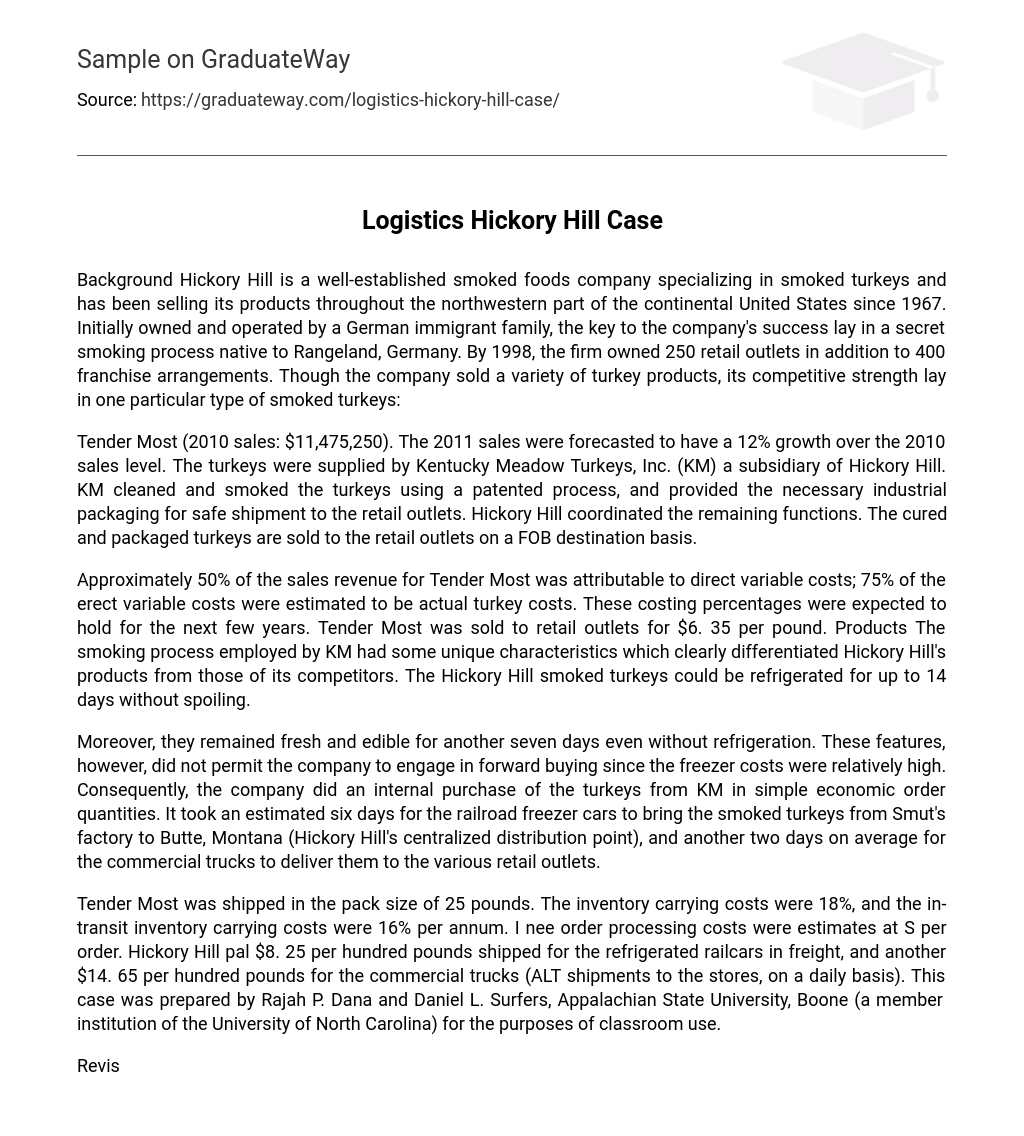Background Hickory Hill is a well-established smoked foods company specializing in smoked turkeys and has been selling its products throughout the northwestern part of the continental United States since 1967. Initially owned and operated by a German immigrant family, the key to the company’s success lay in a secret smoking process native to Rangeland, Germany. By 1998, the firm owned 250 retail outlets in addition to 400 franchise arrangements. Though the company sold a variety of turkey products, its competitive strength lay in one particular type of smoked turkeys:
Tender Most (2010 sales: $11,475,250). The 2011 sales were forecasted to have a 12% growth over the 2010 sales level. The turkeys were supplied by Kentucky Meadow Turkeys, Inc. (KM) a subsidiary of Hickory Hill. KM cleaned and smoked the turkeys using a patented process, and provided the necessary industrial packaging for safe shipment to the retail outlets. Hickory Hill coordinated the remaining functions. The cured and packaged turkeys are sold to the retail outlets on a FOB destination basis.
Approximately 50% of the sales revenue for Tender Most was attributable to direct variable costs; 75% of the erect variable costs were estimated to be actual turkey costs. These costing percentages were expected to hold for the next few years. Tender Most was sold to retail outlets for $6. 35 per pound. Products The smoking process employed by KM had some unique characteristics which clearly differentiated Hickory Hill’s products from those of its competitors. The Hickory Hill smoked turkeys could be refrigerated for up to 14 days without spoiling.
Moreover, they remained fresh and edible for another seven days even without refrigeration. These features, however, did not permit the company to engage in forward buying since the freezer costs were relatively high. Consequently, the company did an internal purchase of the turkeys from KM in simple economic order quantities. It took an estimated six days for the railroad freezer cars to bring the smoked turkeys from Smut’s factory to Butte, Montana (Hickory Hill’s centralized distribution point), and another two days on average for the commercial trucks to deliver them to the various retail outlets.
Tender Most was shipped in the pack size of 25 pounds. The inventory carrying costs were 18%, and the in-transit inventory carrying costs were 16% per annum. I nee order processing costs were estimates at S per order. Hickory Hill pal $8. 25 per hundred pounds shipped for the refrigerated railcars in freight, and another $14. 65 per hundred pounds for the commercial trucks (ALT shipments to the stores, on a daily basis). This case was prepared by Rajah P. Dana and Daniel L. Surfers, Appalachian State University, Boone (a member institution of the University of North Carolina) for the purposes of classroom use.
Revised 2012 by Mary C. Holcomb. Planning Issues for 2011 From a logistical standpoint, management wanted to examine two issues for the planning year of 2011. In 2010, Hickory Hill found itself out of stock of Tender Most on several occasions while the fresh goods were in transit. Since Tender Most was one of their largest selling brands, the company wanted to minimize its costs of lost sales by determining the best reorder point and the best order size. It was estimated that the stockpot costs approximate $65 per case (in future losses) in addition to the obvious contribution margin losses.
The sales department found the following distribution of daily demand from retailers for 2010 on reviewing the last 50 working days: EXHIBIT 1 for Tender Most During Lead Time, 2010 Demand Pounds 39,350 43,725 1 ,749 Cases 1,574 48,575 53,425 57800 1 ,943 2137 2,312 Number of times this quantity was demanded 9 12 The current reorder policy was to place fresh orders as soon as the on-hand inventory was down to 48,575 pounds of Tender Most (1,943 cases). Management wanted to use this information to objectively determine: 1) the optimal reorder point, ND once this was fixed, 2) to compute the optimal quantity of cases to order each time.
In addition to the objectives stated above, management wished to evaluate an alternate mode and methods of transportation. The company could stop the use of the freezer cars for delivery up to Butte, Montana, and use trucking instead. The delivery to the retail outlets would also continue to be done by motor carrier. It was decided that if any changeover is economical for the company and the new system (if any at all) works well Tort lender Most In 2011, In consequent years, salary Tastelessly exercises could be carried out for other products.





